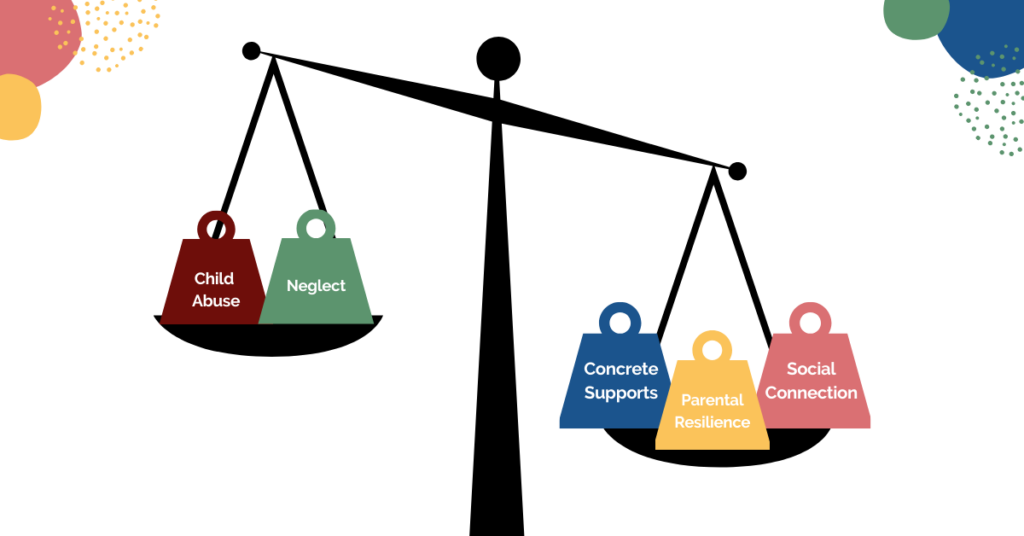
What are the Five Protective Factors?
Have you ever wondered what the Five Protective Factors are and why we talk about them so much? Research shows that the Five Protective Factors strengthen families and significantly help to prevent child abuse and neglect. The Protective Factors approach applies to all areas of school, work, and family life. This approach is versatile and effective. For example, a parent seeking to strengthen their family can use the protective factors to do so. Likewise, a school administrator seeking to support the families of their school can also use the protective factors approach. Similarly, an executive at a company can best invest in their employees with the protective factors.
Even if abuse or neglect have already occurred, protective factors can counteract their negative effects. Children and families are resilient and when given the proper support, they thrive!

The protective factors are (1) parental resilience, (2) knowledge of parenting and child development, (3) social connections, (4) concrete supports in times of need, and (5) social and emotional competence of children. Take a look at this breakdown of each factor so you can better protect the children in your life.
Parental Resilience
Resilience is the ability to cope with life stressors or trauma. When parents have healthy ways to cope with the ups and downs of life, they are far less likely to engage in abusive behavior. Parents who practice resilience model healthy coping behaviors for their children. These children will grow up knowing how to persevere through life’s challenges.

Building parental resilience:
Parents: Seek mental health support when you need it. It’s okay to reach out and ask for help
Schools: Offer a parent night focusing specifically on parental resilience
Knowledge of Parenting and Child Development
When parents understand child development, they can better identify warning signs of abuse. This knowledge can also help parents understand why a child behaves the way they do. Understanding behavior reduces parenting anxiety or guilt. It also helps parents better understand what their child has the capacity for so they can have realistic behavior expectations.
Building knowledge of parenting and child development:
Parents: If you feel like you could use additional support and information about parenting, sign up for our Parents As Teachers (PAT) program!
Schools: A short paragraph about child development in the school or class newsletter provides parents with a quick reference.
Social Connections
Parents who feel valued by and invested in their communities are more likely to reach out for help when needed. Social networks create a place of belonging and stability when life gets hard. Even having a handful of close parent friends can help parents know that they are not alone in their struggles.

Building social connections:
Schools: Schools are the perfect place for parents to build connections. By simply hosting various events (sports, plays, activities, etc.) schools give parents the opportunity to build supportive relationships.
Business: Host family-friendly events. Provide childcare for employee activities so that those with children can also build relationships with others.
Concrete Support in Times of Need
Concrete supports such as, nutrition, medical care, daycare services, etc. reduce stressors and form the foundation of any healthy household. When basic necessities are unavailable, it makes it difficult for a parent to provide other necessities like love, belonging, time, and attention.
Building concrete supports in times of need:
Schools: Know what resources are available within your community. Connect parents to actual people within the organizations so that your families can receive the support they need.
Business: Create family-friendly policies. Offer maternity and paternity leave and allow parents to have the option to work from home when necessary. Provide paid time off for caregivers. Research shows that these policies benefit families and companies.
Social and Emotional Competence of Children
Just like it is important for parents to have healthy emotional skills, it is also important for children. Emotional Competency means that kids know how to identify their feelings and express themselves in healthy ways. Kids who can do so help maintain harmony in the home.

Building social and emotional competence of children:
Parents: Do your best to model healthy social and emotional behaviors for your children. Your children will see how you handle your emotions and take care of yourself and will likely emulate that behavior.
Schools: Provide social and emotional learning opportunities for students. A simple calm-down corner can help students learn to regulate emotions. Have children identify how they feel when they come to class. These small changes can make a huge difference.
Learn More
Prevention is an investment of time and effort upfront and can be thankless precisely because the abuse has been prevented. Even so, implementation of these factors is the best way to support families and keep children safe from abuse and neglect. To learn how you can best implement the protective factors in your life and in your community, register for the Joining Forces Conference on January 26 & 27. Attendees will be able to select from various courses each related to a specific protective factor. Together we can prevent child abuse, Utah!
***If you would like to apply for a scholarship/financial aid to attend the conference, email info@pcautah.org with (1) your first and last name, (2) ages of your children, (3) what county you are from, (4) whether or not you have a home-visitor, and (5) how you learned about the conference**
